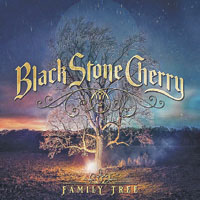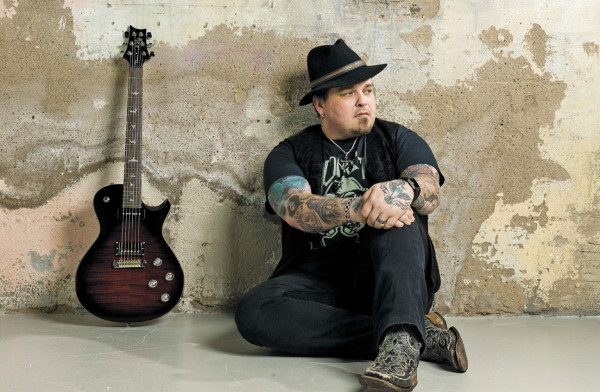
Ten years without a lineup change is a rarity for rock and roll bands. The Edmonton, Kentucky-based Southern rock quartet known as Black Stone Cherry crossed that milestone seven years ago, and as they see it, nobody should be surprised when they breeze past the 20-year marker with the same four guys they started with: lead guitarist and singer Chris Robertson, guitarist Ben Wells, bassist Jon Lawhon and drummer John Fred Young.
“We really wouldn’t know how to play with other people,” says Wells. “We were friends first—we went to school together and spent the night at each other’s houses when we were 15 years old. Then when we decided to play music, we learned the basics together. Everything just grew naturally from there. I think when you start out with a close-knit group of people, you’re not going to have the same problems that exist in other bands.”

Robertson agrees emphatically and says, “There are no egos in this band. Each guy is as important as the other. In fact, we base all our decisions on how it affects each person individually. So it’s the people first and the band second. And that’s how bands should operate. A band should be like a family that gets together to play great music, rather than a bunch of guys that play great music and then go their own separate ways.”
While none of the members of Black Stone Cherry are related to one another, they ooze family spirit, and they’re celebrating their communal bond on their aptly named sixth album, Family Tree. As they did on their last full-length disc, 2016’s Kentucky, they produced Family Tree themselves (Robertson assumed mixing duties as well), and the absence of an outside opinion serves them well. From start to finish, the 13-track album is a brilliantly sustained mix of sound, performance and songwriting smarts. Muscular beasts such as “Carry Me on Down the Road” and “Bad Habit” blend iron-clad hooks and walloping grooves with swampy Southern rock swagger, while the euphoric gospel-soul “My Last Breath” feels like an all-hands-in-the-air revival meeting classic.
Longtime friend and jam-band legend Warren Haynes turns in a memorable guitar-and-vocal cameo on the gut-punch rocker “Dancin’ in the Rain,” and his gritty, three-way ax tussle with Robertson and Wells is just one of the riff-tastic highlights on an album brimming with six-string stunners. “We got to stretch out and do a lot of extended solos on this record, and of course, having Warren on board is just a dream come true,” says Robertson. “More than just the guitar work, I think we really got everything right on this one. It’s a musical and lyrical journey, and it’s just a lot of fun to listen to. This is a beautiful time in our lives and in our career, and I think that comes off in these tunes. It’s uplifting and positive, and man, we’re gonna have a blast playing this new stuff live.”
I assume any time you go in to make a new record, there’s an agenda. What was the plan going into this one?
BEN WELLS There was no plan! [laughs] We never sit around and talk about the theme of a record or how we want it to sound. If we did, it might sound contrived. But what we did do was, last year we released an EP of us doing our favorite blues songs—Muddy Waters, Howlin’ Wolf, Freddie King. It was all the great artists we grew up listening to. We just wanted to have fun and give something to the fans, but I think it had an impact on us as we were writing for this album. The songs were Southern rock because that’s us, but they had a deep blues vibe.
Get The Pick Newsletter
All the latest guitar news, interviews, lessons, reviews, deals and more, direct to your inbox!
CHRIS ROBERTSON I think that’s why the songs kind of fit together, but again, we didn’t think about it or plan it out. We just wrote what we thought was great and did a bunch of demos. I keep my computer with Logic on the bus, so we always have the ability to put ideas down when they come to us. We didn’t rehearse anything—just went into the studio and laid the stuff down. And you can hear it, too. The songs sound spontaneous because they are. The worst thing in the world is when people are playing the same part to death—it’s sterile.
Speaking of Southern rock, how much do you feel there is to mine from the genre? Is it possible to go to new places with it?
ROBERTSON Southern rock is more than a genre of music—it’s a mentality. And I think as long as it’s honest and real and we’re singing about things that people can relate to, you can always take it to new places.
WELLS With us, we’re a Southern rock band, but we’re also blues and we have a harder edge than, say, our friends in Blackberry Smoke, who are more of a country Southern rock band.
ROBERTSON You have your classic Southern rock bands—Skynyrd, the Allman Brothers, Molly Hatchet, .38 Special. Those are the big bands everybody knows, but there are so many more that never get mentioned. But honestly, to me, Mountain is a Southern rock band, even though they’re from New York. “Mississippi Queen”? That’s Southern rock song.

Because you guys are such a Southern rock band—an American band—are you a little surprised at the positive reception you’ve received in the U.K.?
WELLS Oh, man, we’re totally surprised. We never thought we’d get a chance to go to the U.K. or anywhere overseas. What’s happened has been remarkable. We’ve done two different arena tours over there; we released a live DVD in the U.K.; our albums have charted well…and I don’t really know why. I guess fans just appreciate something that’s authentic. We don’t put up any kind of barrier between us. We don’t do the whole rock-star thing. We’re just normal dudes, and we’re thankful every time we step onstage.
ROBERTSON Rock and roll is really healthy over in Britain. There’s still rock and roll TV—lots of videos get played—and there are still a bunch of rock and roll magazines. So I think that’s a big part of it. We’ve never been a big radio band, but fans over in the U.K. love live bands. And we take a lot of inspiration from the great British groups. We’re Southern rock, but there’s a lot of British influence mixed up in there, too.
How do you guys feel you’ve evolved as a twin-guitar team over the years?
WELLS Chris and I have been playing guitar together for 17 years now, and we’ve learned what each other does best and how we can complement each other. We’re not fighting for attention when it comes to playing on records or in a live performance. We let each other shine. It’s total teamwork.
ROBERTSON The thing about Ben is, he’s solid. He’s like Malcolm Young—that rock foundation of the band. But he also brings an element of rockabilly-infused stuff. He’s big into Scotty Moore and James Burton, whereas I come more from the blues mentality of Hendrix and Freddie King and stuff like that.
WELLS I think my lead playing has more tension to it, a kind of nervous energy. I like Chet Atkins and Jerry Reed, so I go for more of their style. Chris is smoother and has more “fuzz” to his playing. If something calls for more of a Hendrix or Skynyrd-type solo, that’s his deal.
ROBERTSON You put all that together and it’s really cool and unique. It’s like blues and country with some metal-infused Southern rock. And let me tell you: It’s a hell of a lot of fun to play, man. We’re the luckiest dudes on the planet to get to do what we do.
The number of great riffs on this record is pretty staggering. Does it become harder to write good riffs as you guys go along?
ROBERTSON I do feel like you get in ruts a lot of times. On the majority of our records, there’s a lot of drop-D and drop-C tunings. But on this new record, most of this stuff is just a half-step down in standard tuning, so we kind of re-imagined how we wrote the riffs. Let’s face it: There’s only so many drop-D riffs you can come up with. After a while, they start to sound the same.
WELLS All four of us write together, and basically everything starts with a guitar riff. We’re a riff-based band. I might play a riff with Chris, but if nobody starts jamming to it, we’ll be like, “Okay, file that one for another time.” Riffs can be challenging. Sometimes they sound simple and you think, Is this too simple? But if you work on them, you can overcomplicate them and they start to sound sterile. Most of the time, a great riff jumps out the way it’s supposed to be the first time around, and you shouldn’t question it.

“James Brown” is a pretty striking song. It’s got funk, wild wah-wah solos and a fierce metal stomp. How did that song come together?
ROBERTSON Ben had the initial guitar riff that’s behind the verse, and then we came up with the Hendrix-like chords in the chorus. We weren’t trying to be funk, but it just happened that way.
WELLS That was the first song we wrote for this album. We always write the music before the lyrics, and the riff just reminded us of James Brown. The song basically named itself. We’re heavily influenced by James Brown, the Meters, and we all love Parliament. They’ve all got amazing guitar riffs.
ROBERTSON Originally, the song had a different bridge, so that changed. I took a stab at the solo and then we changed the riff underneath a bit. That just kind of brought it to life a little more; it brought out the Hendrix-inspired guitar solo with the wah and the overdriven sound.
You’ve known Warren Haynes for a while. What went into him performing on “Dancin’ in the Rain”?
WELLS Man, we’ve been huge fans of Warren for a long time. From the Allman Brothers to Gov’t Mule to his solo stuff—he’s the man. We went to see Gov’t Mule and Blackberry Smoke in Nashville last summer, and after the show we talked to Warren about possibly touring together, all of us. And Warren was totally into it.
ROBERTSON But when it came to the song, we were doing the record and we just decided to have our management reach out to his people and be like, “Hey man, would you be interested in being on this song?”
WELLS He said, “Absolutely.” As you can imagine, we were so thrilled with that. He had a couple of days off from touring, so we had the tracks sent up to his studio. He asked us what we wanted him to do, and we just said, “It’s a canvas, man. Do what you do.” And he sent it back to us, and we were like, “Whoa, he knocked it out of the park!” And man, let me tell you, when we heard his vocals, we were even more thrilled—it sounds like he and Chris are right at the mic together.
ROBERTSON To have one of your heroes and one of your biggest influences as a singer and guitar player on your record is just surreal. When I put the record on and just to listen to it, every time his guitar comes in at the very top, it’s like, “Holy crap, man! We’ve got Warren Haynes on this damn song with us!” [laughs]
A few years ago, Florida Georgia Line had a big hit with your song “Stay.” What did you think of their version?
ROBERTSON We loved it! Apparently, those guys had been fans of ours for a long time. They used to do our songs at some of their shows, back before they had a record deal. So one day we got an email saying, “Hey, just so you guys know, FGL cut ‘Stay’ on their record, and it’s potentially going to be a single.” We were like, “That’s amazing.” It introduced one of our songs to a large population of people that would not have heard it otherwise. And it’s something we’re extremely grateful for and thankful that they did. You know, you can’t be precious about this stuff. Joe Cocker had a hit with the Beatles’ “With a Little Help from My Friends.” Now, that might be sacrilegious to some, but at the end of the day, it’s all about the song and how it affects people.
WELLS Truth is, we wanted our version to be released. We told our former record label at the time, “Man, we think this is a special song. We should probably release it.” And they were like, “Eh, don’t think so. It’s not Active Rock enough.” You know, whatever. And then Florida Georgia Line cuts it and it becomes huge, and we’re like, “Man, we knew that was a special song!” But granted, if we had done it, who knows if they would have cut it. We might have missed out on a hit, so it all worked out.
AXOLOGY:
GUITARS: (Robertson) PRS Guitars SE Chris Robertson signature model, PRS McCarty Singlecut 594 Soapbar, PRS Reclaimed Limited CE 23 Semi-Hollow, 1973 Fender Stratocaster; (Wells) 2000 Les Paul Classic, 1978 Fender Stratocaster, Fender American Deluxe Telecaster
AMPS: (Robertson) Line 6 Helix Guitar Multi-Effects Processor; (Wells) Budda Superdrive 45 Series II head, Fender Bassbreaker 45 combo
EFFECTS: (Robertson) Vox V846HW wah, Strymon Lex rotary speaker simulator; (Wells) Budda Budwah Standard
Joe is a freelance journalist who has, over the past few decades, interviewed hundreds of guitarists for Guitar World, Guitar Player, MusicRadar and Classic Rock. He is also a former editor of Guitar World, contributing writer for Guitar Aficionado and VP of A&R for Island Records. He’s an enthusiastic guitarist, but he’s nowhere near the likes of the people he interviews. Surprisingly, his skills are more suited to the drums. If you need a drummer for your Beatles tribute band, look him up.










